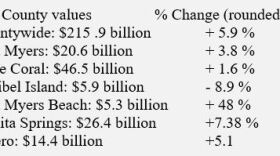'Abandoned and Historic Cemeteries'
Florida House minority leader Rep. Fentrice Driskell wants to expand the state’s program to preserve abandoned and neglected cemeteries. If passed, she says HB 49 would build on the state’s Abandoned Cemeteries Task Force and its ongoing efforts to preserve Black history.
"In the months leading up to last year’s legislative session, the task force made a number of recommendations, and this bill seeks to codify those," said Driskell. "Last year I introduced HB 1215 which sought to incorporate some of those, and it passed through all of its committee stops. Now with HB 49 this year, we have a chance to finally put those recommendations into place and honor those who sometimes were forgotten and degraded."
The state would set aside over $1 million dollars to provide cemetery education and maintenance. The legislation is awaiting its second reading on the House floor.
'Florida Museum of Black History'
A similar bill is also making its way through the chambers. SB 1606, would start a task force to create a new Black History Museum.
The multipurpose building would be used for events and showcase Florida’s historical African American events and prominent leaders like Bethune Cookman University founder Dr. Mary McLeod Bethune.
If passed, Governor Ron DeSantis and his staff would appoint 9 members to the force by the end of July.
'Required African-American Instruction'
Meanwhile, senate committees are considering huge changes to K-12 education. Republican Senator Corey Simon of Tallahassee has a bill that would require Florida schools to teach African American history and provide proof of that instruction.
This measure comes after an education task force reported fewer than a dozen of the state’s 67 public school districts are considered exemplary at teaching black history.
Orange County Democratic Sen. Geraldine F. Thompson is a member of that task force. She discussed the problem earlier this year amid a fight over an AP Black Studies course the state rejected.
"It’s been 30 years," said Thompson. "There has been no consequence whatsoever for instructors who are not teaching African American history."
That teaching includes the development of slavery and the abolitionist movement.
'Required Instruction in the History of Asian Americans and Pacific Islanders'
A similar bill, HB 287, is headed to the House floor for a full vote. The proposal seeks to expand Florida’s K-12 education standards to also include teaching Asian American and Pacific Islanders’ history.
Citrus County Republican Representive Ralph E. Massullo supports the bill.
"We have a beautiful and diverse country with so many different people from so many places around the world," said Massullo. "They all have a story and that story blends into ours and makes the beautiful substance what we call the United States of America."
Under the legislation, classroom instruction would also require school districts to teach about Japanese Americans during World War II, this would include discussions on immigration, citizenship, civil rights, and identity.
The moves come amid intense scrutiny of how the state is attempting to ban associated subjects like intersectionality, critical race theory, and diversity, equity, and inclusion.
Gov. Ron DeSantis and the Republican-led legislature have faced accusations of attempting to downplay or quote: “whitewash” history. Driskell says the measures show Republicans and Democrats can compromise, but the representative remains unsteady about the proposal.
“I don’t think that absolves the Republicans to ban Black history, to water it down, to not teach it accurately in our schools...so both things can be true at the same time, where that we can find common ground in one area and not in another," said Driskell. "So, we have to continue to work harder to make sure our history does not get erased.”
Copyright 2023 WFSU.







